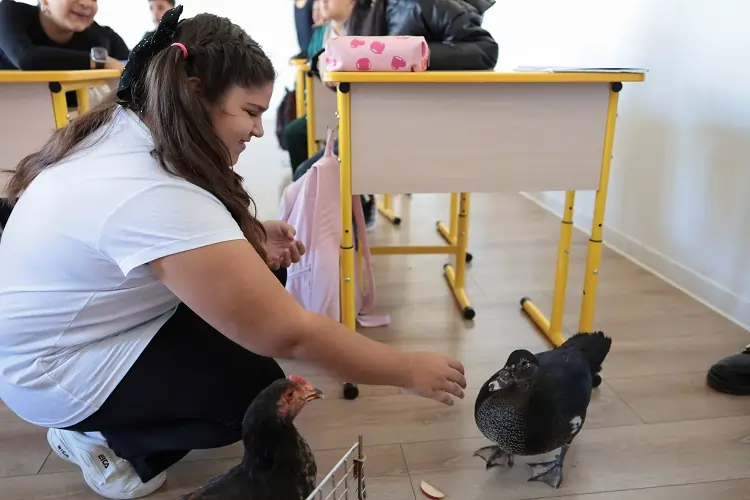
By Luiza Ilie
SINDRILITA, Romania (Reuters) – On a crisp morning in early November, Romanian veterinarian Oana Vasiliu arrived at the Sindrilita village school with her teaching assistants in tow: a rescue hen named Rodica and a duck called Bubbles.
Soon, the two animals were strolling down the aisles past yellow-trimmed desks in a fifth-grade classroom at the school near the capital Bucharest as excited children took turns feeding them spinach leaves and insect larvae.
Around 20 schools in the southern county of Ilfov are pioneering an animal awareness class for fifth- and sixth-graders this year in a project officials hope will boost empathy, learning, and help combat bullying.
The children visit animal shelters and sanctuaries, like Vasiliu’s wild animal rescue foundation Visul Luanei, as well as interacting in the classroom with animals including a dog with a missing leg and a cat with one eye – encounters that those working with them say evoke strong empathy.
“We hope the children become more empathetic with people as well, because bullying in schools has reached fairly large proportions,” said Ilfov county council animal protection adviser Raluca Baleanu.
Romania invests far less in education than rich countries in Europe, or the United States, and has the highest school drop-out rate of the 27 countries in the European Union, with rural schools particularly affected.
In class, 11-year-old Ana-Maria Neagu spent a long time tenderly touching Rodica, an injured chicken which likely came from a battery cage at an egg factory farm.
“I love chickens very much, I have 25 at home and I play with all of them,” she said.
Rodica’s story saddened Yasmina Dinu, also 11. “If this were to happen to my chickens it wouldn’t sit well with me. Some animals are hurt by people, they don’t get affection.”
Eight weeks into the programme, its coordinator at the school, history teacher Sorin Sirbeanu, said learning and engagement had improved beyond expectations.
“Simply put, this is a great idea.”
(This story has been corrected to rectify a name to Neagu, not Dragu, in paragraph 7)
(Editing by Philippa Fletcher)


